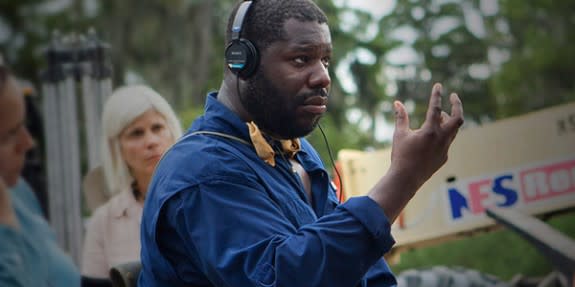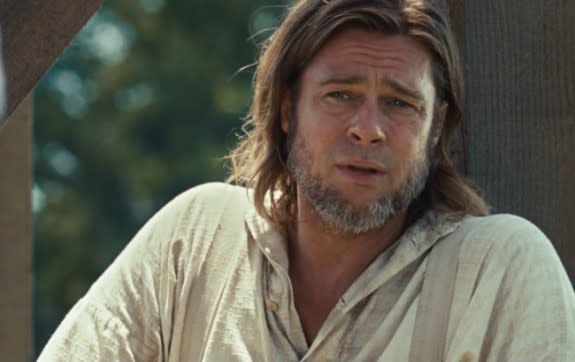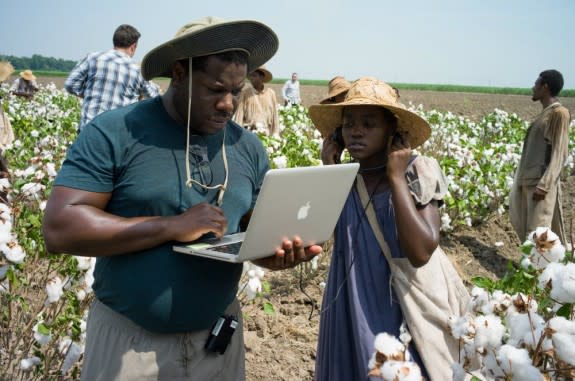OSCARS Q&A: Steve McQueen On ‘12 Years A Slave’ – “It Was As Real As It Got”
For having covered such dark material in all three of his feature films—Hunger (2008), Shame (2011) and this year’s 12 Years A Slave — Steve McQueen will be the first to admit he’s actually a happy, jovial guy. And with all the recent accolades pouring in, he’s got a lot to smile about. Already a winner as best director from New York, Washington D.C. and Boston critics groups, McQueen also nabbed a Golden Globe nomination and is courting Oscar. His harrowing look at slavery, a subject Hollywood rarely explores, has defied any expectations that some of the violent scenes depicted in the film would affect its reception at the box office.
Related: OSCARS: A Crowded Field Vying For Directing & Writing Noms
AwardsLine: Hollywood has not really tapped into slavery as much as, say, the Holocaust. People are responding to it because it is, oddly enough, a new subject for them in movies.
Steve McQueen: I suppose you’re quite right. Also, what’s interesting about this being a new subject is that it’s about our shit history. Even if I’m British, it’s my shit history too. The screen becomes a mirror that reflects this unfortunate recent past. But that past is strangely about love. What I mean is that through all the unfortunate situations that have happened, the slaves survived what limited choices they had and they brought up their children. And through that comes someone like me. The fact that I’m sitting here talking to you is because of my ancestors’ sacrifices. And I don’t take that for granted.
Related: ‘12 Years A Slave’ Leads London Critics’ Circle Nominations
AwardsLine: How did you connect with Plan B and producer Brad Pitt for this?
McQueen: After Hunger, the people from Plan B basically pursued me and wanted to work with me. It was very flattering. There were other people (interested), but (Plan B) was very persistent and it was in a very organic way. I told them I wanted to make a movie about slavery, and that was it. I met Brad in London when he was (working on) World War Z, and we had a fantastic three-hour meeting over a couple glasses of wine. He’s very focused, very attentive to detail and very direct, and that was wonderful.
AwardsLine: Was it always your intention to cast him in the film?
McQueen: (With) a producer and a great actor like Brad Pitt, you sort of have to put him in the film. It’s like a two for one. You never get two for one!
AwardsLine: You did a Q&A at the Telluride Film Festival, and you said finding the book was like finding the diary of Anne Frank.
McQueen; The question is, why do we know Anne Frank and not Solomon Northup? His book was written 97 years before Anne Frank’s diary. And he was lost; he was buried. Thank God for my wife who found his book. It’s just interesting that I live in Amsterdam, (where) Anne Frank is a national hero, and no one knows Solomon Northup. My whole idea with making this film is that he becomes a hero because he is a hero—a real American hero. Solomon fulfills that prophecy that you have in this country, which is the right to pursue happiness—that’s what Solomon wanted to do.
AwardsLine: Did you ever think making this film would have such an impact?
McQueen: I never really thought about it. I’m just happy that people went out to see the movie. (What) matters is that people are discovering the movie and going—not necessarily (just) African-Americans. For me, that’s been the most beautiful thing, really. It’s historic. I was in Minneapolis at the Walker Art Center (showing) my work, and some people from the African-American community were upset that they weren’t included in this viewing of the film. So Fox helped to facilitate the cinema, and 500 people came to the next screening and there were more outside for the Q&A. There were black folks and white—it was America. And the passion of the discussion… You know my movie is not a passive movie, it’s a call to arms to do things like this. Reading newspapers, watching television, we always feel helpless, but actually we can do something.
AwardsLine: A lot of people have focused on the brutality of the film.
McQueen: I think we’ve overcome that with the evidence that people are going to see it. Critics saw it and (were) predicting what they thought would happen with audiences. And they were obviously proven wrong.
AwardsLine: You tend to hold shots, which makes some of the scenes in the film tense, like the one in which Patsey (Lupita Nyong’o) is brutally whipped.
McQueen: It was one take. If I put a cut in there, it would have taken all the air out of the scene. The camera is moving with the actors, and you don’t know what’s going to happen next—as in life. You’re in the film—there is no frame; you’re living it. I designed it that way because that scene deserved that kind of attention.
AwardsLine: You also shot the film on real plantations in Louisiana.
McQueen: Those trees have seen everything. For example, the tree that we used to show the two guys getting lynched was an actual lynching tree. It was as real as it got. We were dancing with the ghosts. Everyone was in tune in making this environment. They can see around them the same views those slaves had and the same views plantation masters had. So every day you’re reminded of that history.
Get more from Deadline.com: Follow us on Twitter, Facebook, Newsletter



